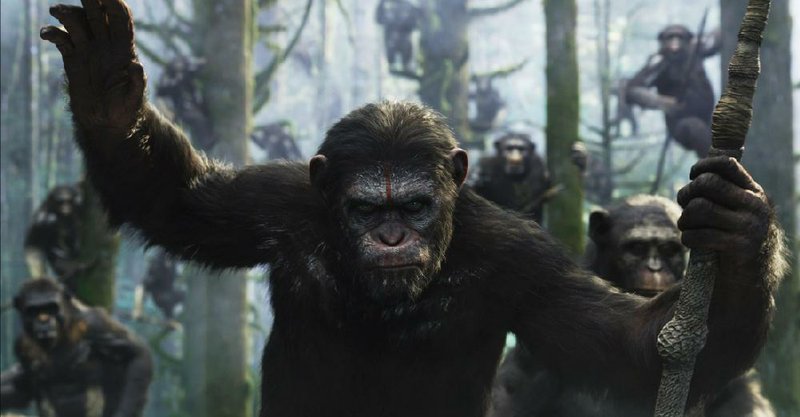The original Planet of the Apes, made back in 1968, concerned a human astronaut (memorably played by Charlton Heston) in the future who crash lands on a planet with his crew and discovers it to be run by intelligent apes, with the existing humans on the planet mute and savage, used for sport hunting or medical experiments.
Originally crafted by The Twilight Zone's Rod Serling (based on a French novel by Pierre Boulle), though extensively rewritten, the film retained the kind of twisty shock ending for which Serling's TV show was famous. Playing off the idea that mankind is barbarously cruel to the animal kingdom, it posits a clarifying counterargument to our species' disregard for nature: What if we saw how our treatment could be viewed from the other perspective?
Dawn of the Planet of the Apes
89 Cast: Jason Clarke, Gary Oldman, Keri Russell, Andy Serkis, Toby Kebbell, Kodi Smit-McPhee, Kirk Acevedo, Judy Greer, James Franco
Director: Matt Reeves
Rating: PG-13
Running time: 130 minutes
The film was wildly popular, spawning no fewer than four sequels over the subsequent five years, a TV show, comic book and many, many branded Halloween costumes. After that particular bout of Ape-mania, the fad wore off, people moved on to other things (among other things, by the end of 1973, The Exorcist had made its harrowing debut). The series lay dormant for almost 30 years, save one unfortunate Tim Burton remake, until 2011's Rise of the Planet of the Apes, written by husband and wife team Rick Jaffa and Amanda Silver, which was a surprise success. Instead of remaking the remake, they smartly decided to tell a different sort of story, set in the present day, at the very beginning of the viral outbreak that would eliminate most of the human race, and what would become the eventual ape revolt.
They also introduced us to Caesar (played brilliantly by Andy Serkis), the young, extremely intelligent chimpanzee who would start as a beloved lab pet and end up successfully leading the apes out of the city and into the woods outside San Francisco. In so doing, the film made a far more eloquent case against man's inhumanity to his fellow creatures (many of Caesar's original army are composed of different apes who had been subjected to cruel and merciless experiments) and his tendency to wreack havoc on a given ecosystem.
This sequel begins 10 years from where the last one left off. In the ensuing decade, the genetic virus known as "simian flu" has wiped out nearly the entirety of humanity, with only lone pockets of people -- those lucky enough to be genetically indisposed to the virus -- surviving. As humans flailed, the apes, led by Caesar, have thrived, building an entire community out in their woods, prospering by following Caesar's careful planning and strict edicts (on a rock face wall, there is written a sort of list of ape commandments, the first of which reads "Ape not kill ape").
As it happens, though, the ape village happens to be near an old dilapidated dam that the small tribe of humans still living in San Francisco need to restart in order to supply electricity to their little enclave. A search party is sent out, including Malcolm (Jason Clarke), a thoughtful and moderate man, who started the enclave with the far more militant Dreyfus (Gary Oldman); Alexander (Kodi Smit-McPhee), his teen son; Ellie (Keri Russell), a doctor and Malcolm's love interest; and Carver (Kirk Acevedo), a hotheaded dam expert, hell-bent on blaming the apes for the outbreak of the virus.
Of course, just as Carver won't trust the apes, some of the apes follow in kind. Caesar's old running mate Koba (Toby Kebbell), a warmonger chimp set on stealing Caesar's throne, sets up an elaborate scheme to assassinate his ape chieftain and blame it on the humans, setting off a war and taking power in the process.
As with the first film, Jaffa and Silver's script, directed by Matt Reeves, takes its sweet time to set up its conflict. Unlike so much of what has been released so far in this disappointing summer, there is no sense of being rushed heedlessly on to the next action piece or plot point. The story is decidedly Shakespearean, with time and attention paid to detailing the distinct emotional lives of the apes (who communicate via a combination of hand signals, expressions and somewhat more regrettably, English) and the humans. The result is an even-handed approach, allowing us to see the complex and delicate nature of animal/human diplomacy and where things can go horribly wrong on either side.
For its stately pacing, though, it remains emotionally gripping for nearly all of its slightly elongated run time (clocking in at 130 minutes, that's a whole lotta ape), precisely because it does take the time to show its heroes' emotional intricacy. Just before the final act of the film, there is an extended scene with Caesar, brought back to his old house in the city to keep safe, watching a video of himself as a young chimp, communicating with his old friend (James Franco, who somehow still made money from this even though he was never on set). We see the video, watch Caesar watching it and are led to feel his nostalgia for his younger, far more innocent self, before the cold, cruel hand of mankind stained his adolescence and shaped him into the conflicted warrior he has become.
If the film has one notable flaw, it's the rising use of anthropomorphism to tell the apes' side of things. As the film progresses, there are an increasing number of scenes of apes cracking jokes at one another, going for extended emotional hugs, crying tears (a humans-only thing) and generally being fully recognizable: humans by any other name, just with fanged teeth and serious back hair. The film is far more affecting in its first third, when the apes use more traditional ape communication -- hand signals, guttural growls, shifting eyebrows, and we read the film's subtitles in order to understand what they are saying. In increasing the emotional pathos, the filmmakers also choose to take away more and more of their inherent ape-ishness, which feels like a cheat and diminishes some of the film's power.
Still, for all the myriad ways this film could have gone off the rails, like its predecessor, it is surprisingly effective. An eloquent update on the original concept, this version of the series pulls off the difficult task of having a nonanimal hero be the fascinating dramatic fulcrum. The series is no longer powered by TV show irony and allegorical sweep. Now it's a full-fledged familial drama, played out in the real and the concrete jungle. This is the final twist: We no longer watch the apes in bemused horror or resentment; we're actually pulling for them to win.
MovieStyle on 07/11/2014


